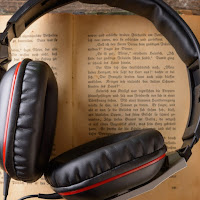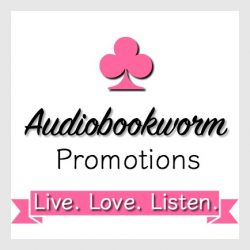This week, LitHub.com published a great article by Academy Gothic author James Tate Hill. In the article, Audiobooks: The Past, Present, and Future of Another Way to Read, James Tate Hill Offers a Brief History of Recorded Matter, Hill outlines audiobooks' origins as an aid to the blind and infirm and follows their progress into the mainstream.
I have long argued that audiobooks continue the tradition of oral storytelling that can be found in the history of every human culture across the world, and Hill echoes that point when he says,
For millennia, until Johannes Gutenberg’s marvelous invention, most stories were shared orally. No one I’ve spoken to believes print will ever be replaced, but a new, old-fashioned method is allowing written words to reach larger audiences. My mom, who never found the time or energy to read print books, is enjoying novels for the first time since high school, thanks to audiobooks. Many once asked if books on tape were cheating. Today, as a result of increased access, we are finally asking the most important question about audiobooks: What are you reading?reading.
Many people still regard listening to an audiobook as somehow less authentic than reading the printed book. It's an attitude which isolated me from book-clubs and reading communities for a long time when I could only access novels in audio formats, and prompted me to set up an audiobook discussion group for people with chronic illnesses and disabilities, Chronic Creatives Hearing Things.
In the article, Slate book-critic Laura Miller counters that perspective nicely.
Nowhere in this piece have I used the word listening or consuming to describe what we do with audiobooks. Some will quibble with this—I have perused the comments sections of essays I’ve written about reading with my ears. To those who are protective of the verb to read, I ask what is gained by insisting on the distinction? If a quarterback can read a defense and a computer can read a file, it doesn’t seem like a leap to call 10 or 20 hours of processing words that happen to enter our brains through the ears reading.
To put it another way, responding to the question of whether audiobooks count as reading, author and book critic for Slate Laura Miller replied via email, “What does ‘count’ mean? Who is counting? We’re not in school and completing assignments anymore. If the point of reading is to enjoy it and you’re enjoying it, why would anything be lacking?”
Because many of my book group cannot sight-read an article of this length but are very keen on the topic, I have (admittedly rather cheekily) uploaded a reading of it to Soundcloud. Copyright of this article remains firmly with the author James Tate Hill and LitHub.com. If they ask me to remove the audio then I'll take it down and edit it out of the post, but as it's all about the frustration of being unable to find reading material in more accessible formats, I'm hopeful that they will allow it to remain.
As for the recording, well... I am not a narrator. Professional narrators do a wonderful job, not only performing the work in question but often editing and producing it too these days, as home studios become the norm for many. There's more fluffing, gulping, and heavy breathing in this recording than there was in the erotic anthology I reviewed a few days ago! This is why narrators are worth their weight in gold; reading aloud for sustained periods is hard. (Especially if, like me, you're recording in fits and starts on a mobile phone whilst flat out in bed on a rather low-energy day.)
If you'd struggle to read the article in print then listen away, but don't get your hopes up and try not to cringe at the forty-six different ways I manage to pronounce 'library' in 24 minutes. If the original text would be easier for you, then follow the link at the top of this post and show LitHub some love.












No comments